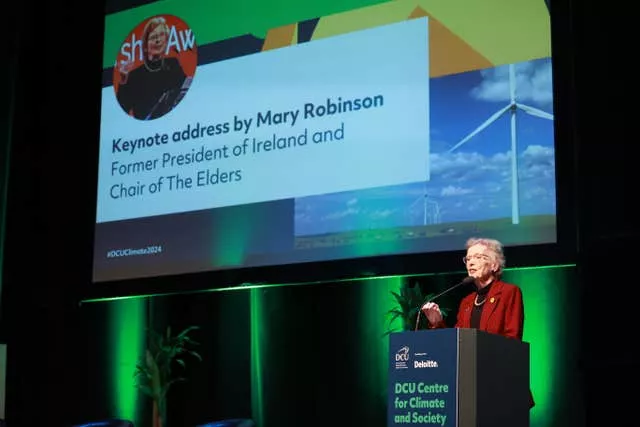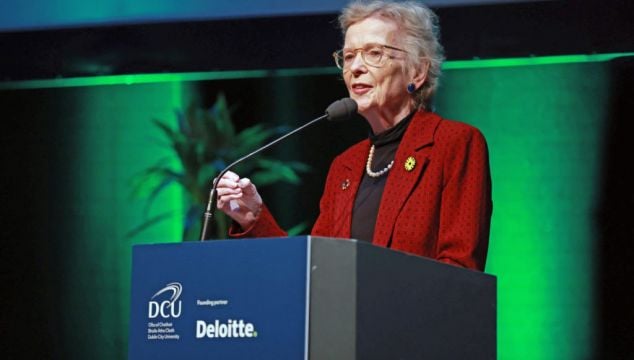Mary Robinson has said money should be spent on climate change measures now or Ireland’s future will be “more grim”.
The former president said there was a need for urgency and leadership on climate and that it was “not good” that Ireland was on track to reduce its carbon emissions by 29 per cent rather than 50 per cent by 2030.
She said that scientists are becoming more “bruised and frustrated” that their voices are not being heard often enough and that “time is of the essence”.
The Co Mayo native said that it was “sad to hear” how Irish farmers were struggling after unseasonably wet weather in recent months meant that grounds were too sodden for many farmers to sow crops.
“Farmers are suffering greatly in this country from exactly what was predicted: much greater precipitation, meaning more rain, more flooding,” she told the DCU Centre for Climate and Society conference on Tuesday.
“I think we really have to incentivise heavily to move in the right direction more. I sometimes feel that we need to spend our children’s and our grandchildren’s money more now or our children and grandchildren won’t have the future they want.”
During a segment with questions from the audience, she elaborated on this point: “We should be, as I say, incentivising more, spending more money cleverly now, because otherwise the future will be even more grim for farmers and grim for others.
“I think we have a beautiful island. We could make it the greenest, the most sustainable island in the world, and everybody would benefit. That’s what I’d love to see.”
She said that everyone needed to change their behaviour and anyone with a level of responsibility needed to have a sense of “urgency” about the climate, not just at government level but down to local council level.

Asked whether it would help if politicians led by example by travelling to work by bike, travelling to Brussels over land, or by changing their diet, the former president said she agreed it would.
“Personally, we don’t have a car anymore,” she said. “I take public transport as much as possible, bus and train. I have to fly because very often, I’m flying with a tight schedule, that’s the problem.”
Mrs Robinson said that she was taking part in a “slow” music festival in Galway that doesn’t encourage travel from abroad, and those within Ireland are encouraged to travel by public transport.
She also said that art was “vital” in changing behaviour, adding: “You don’t move people with statistics or even frightening them with the crisis that we’re in. You move people from the heart, and art actually is a great way of moving people from the heart.”
Mrs Robinson said the key indicators on climate are now going “worryingly the wrong way” and said there needed to be a focus on “where the money is going”.
She said that The Elders – an international group of former leaders formed in 2007 by Nelson Mandela, of which she is the chair – have advocated for long-term political thinking and different generations to speak to one another about climate.

“We do need and long-term thinking and unfortunately, because of social media 24/7, we’ve more and more tendency towards populist solutions, which are really very seriously dangerous, because they’re not thought through, but they get large followings.”
Mrs Robinson wore her usual UN sustainable development goals “wheel” badge on her lapel, along with a new dandelion badge.
She said that she had founded Project Dandelion, a women-led climate justice movement to unite people on combatting the “powerful” fossil fuel lobby.
She said the dandelion was chosen as a symbol because it grows on all continents, it’s resilient, it has deep roots, and you can eat and drink every part of it.
“Now, why am I so focused on symbols? Actually, I learned a big lesson when I was elected president in 1990. I said, as some of you will recall, that I would put a light in the window of Aras an Uachtarain for all of those who had to leave Ireland over the centuries.
“And frankly I totally underestimated that light, it took a life of its own. It worked 24/7 and it created an Irish diaspora.”

She said that during visits to the US, Canada, Australia, Argentina and other parts of Europe, people would say to her: “We know you have a light in the window and it matters so much to us”.
“That was the way in which the light worked,” she added.







